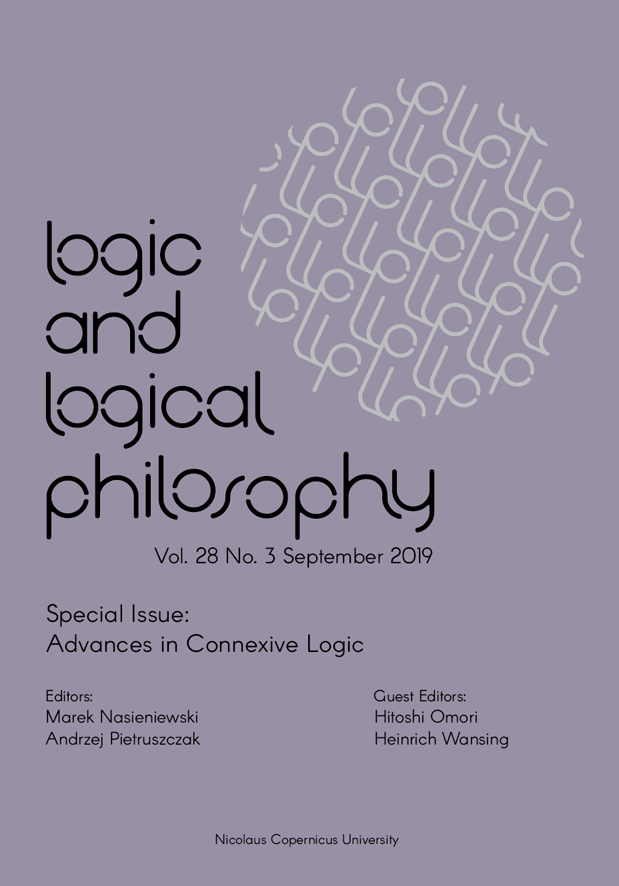Connexive Conditional Logic. Part I
DOI:
https://doi.org/10.12775/LLP.2018.018Słowa kluczowe
conditional logic, connexive logic, paraconsistent logic, Chellas frames, Segerberg frames, general frames, first-degree entailment logic, Aristotle’s theses, Boethius’ theses, extension/anti-extension pairs, tableauxAbstrakt
In this paper, first some propositional conditional logics based on Belnap and Dunn’s useful four-valued logic of first-degree entailment are introduced semantically, which are then turned into systems of weakly and unrestrictedly connexive conditional logic. The general frame semantics for these logics makes use of a set of allowable (or admissible) extension/antiextension pairs. Next, sound and complete tableau calculi for these logics are presented. Moreover, an expansion of the basic conditional connexive logics by a constructive implication is considered, which gives an opportunity to discuss recent related work, motivated by the combination of indicative and counterfactual conditionals. Tableau calculi for the basic constructive connexive conditional logics are defined and shown to be sound and complete with respect to their semantics. This semantics has to ensure a persistence property with respect to the preorder that is used to interpret the constructive implication.
Bibliografia
Adams, E., 1975, The Logic of Conditionals, D. Reidel, Dordrecht, Netherlands. DOI: http://dx.doi.org/10.1007/978-94-015-7622-2
Almukdad, A., and D. Nelson, 1984. “Constructible falsity and inexact predicates”, Journal of Symbolic Logic 49: 231–233. DOI: http://dx.doi.org/10.2307/2274105
Belnap, N., 1977, “A useful four-valued logic”, pages 8–37 in Modern Uses of Multiple-Valued Logic, edited by J.M. Dunn and G. Epstein, D. Reidel Publishing Co. DOI: http://dx.doi.org/10.1007/978-94-010-1161-7_2
Bošić, M., and K. Došen, 1984, “Models for normal intuitionistic modal logics”, Studia Logica 43: 217–245. DOI: http://dx.doi.org/10.1007/BF02429840
Chellas, B., 1975, “Basic conditional logic”, Journal of Philosophical Logic 4: 133–153. DOI: http://dx.doi.org/10.1007/BF00693270
Delgrande, J.P., 1987, “A first-order conditional logic for prototypical properties”, Artificial Intelligence 33: 105–130. DOI: http://dx.doi.org/10.1016/0004-3702(87)90053-1
Delgrande, J.P., 1988, “An approach to default reasoning based on a first-order conditional logic: Revised report”, Artificial Intelligence 36: 63–90. DOI: http://dx.doi.org/10.1016/0004-3702(88)90079-3
Došen, K., 1985, “Models for stronger normal intuitionistic modal logics”, Studia Logica 44: 39–70. DOI: http://dx.doi.org/10.1007/BF00370809
Dunn, J.M., 1976, “Intuitive semantics for first-degree entailment and ‘coupled trees’”, Philosophical Studies 29: 149–168. DOI: http://dx.doi.org/10.1007/BF00373152
Gärdenfors, P., 1988, Knowledge in Flux. Modeling the Dynamics of Epistemic States, MIT Press, Cambridge, Mass.
Kamide, N., and H. Wansing, 2015, Proof Theory of N4-related Paraconsistent Logics, Studies in Logic, vol. 54. College Publications, London.
Kapsner, A., and H. Omori, 2017, “Counterfactuals in Nelson logic”, pages 497–511 in Logic, Rationality, and Interaction. Proceedings LORI 2017, edited by Baltag et al., Jeremy and Yamada, Tomoyuki, Springer, LNCS 10455. DOI: http://dx.doi.org/10.1007/978-3-662-55665-8_34
Lambek, J., 1958, “The mathematics of sentence structure”, The American Mathematical Monthly 65: 154–170. DOI: http://dx.doi.org/10.2307/2310058
Lewis, D., 1973, Counterfactuals, Blackwell, Malden, MA.
McCall, S., 2012, “A history of connexivity”, pages 415–449 in Handbook of the History of Logic, edited by D. Gabbay et al., volume 11, Elsevier. DOI: http://dx.doi.org/10.1016/B978-0-444-52937-4.50008-3
Nute, D., 1984, “Conditional logic”, pages 387–439 in Handbook of Philosophical Logic, edited by D.M. Gabbay and F. Guenthner, vol. 2, D. Reidel Publishing Company, Dordrecht, Netherlands. DOI: http://dx.doi.org/10.1007/978-94-009-6259-0_8
Odintsov, S.P., 2008, Constructive Negations and Paraconsistency, Dordrecht: Springer-Verlag. DOI: http://dx.doi.org/10.1007/978-1-4020-6867-6
Omori, H., 2016, “A simple connexive extension of the basic relevant Logic BD”, The IfCoLog Journal of Logics and their Applications 3: 467–478.
Pizzi, C., and T. Williamson, 1997, “Strong Boethius’ thesis and consequential implication”, Journal of Philosophical Logic 26: 569–588. DOI: http://dx.doi.org/10.1023/A:1004230028063
Priest, G., 1999 “Negation as cancellation, and connexive logic”, Topoi 18: 141–148. DOI: http://dx.doi.org/10.1023/A:1006294205280
Priest, G., 2008, An Introduction to Non-Classical Logic, 2nd edition, Cambridge University Press. DOI: http://dx.doi.org/10.1017/CBO9780511801174
Schurz, G., 1998, “Probabilistic semantics for Delgrande’s conditional logic and a counterexample to his default logic”, Artificial Intelligence 102: 81–95. DOI: http://dx.doi.org/10.1016/S0004-3702(98)00042-3
Segerberg, K., 1989, “Notes on conditional logic”, Studia Logica 48: 157–168. DOI: http://dx.doi.org/10.1007/BF02770509
Simpson, A., 1994, “The proof theory and semantics of intuitionistic modal logic”, PhD thesis, University of Edinburgh.
Stalnaker, R.C., 1968, “A theory of conditionals”, pages 98–112 in Studies in Logical Theory, edited by N. Rescher, Basil Blackwell, Oxford. DOI: http://dx.doi.org/10.1007/978-94-009-9117-0_2
Stalnaker, R.C., 1980, “A defense of conditional excluded middle”, pages 87–104 in IFS, edited by W.L. Harper, R. Stalnaker and G. Pearce, Springer Netherlands, Dordrecht. DOI: http://dx.doi.org/10.1007/978-94-009-9117-0_4
Unterhuber, M., 2013, Possible Worlds Semantics for Indicative and Counterfactual Conditionals? A Formal Philosophical Inquiry into Chellas-Segerberg Semantics, Ontos Verlag (Logos Series), Frankfurt am Main. DOI: http://dx.doi.org/10.1515/9783110323665
Unterhuber, M., 2016, “Beyond system P? Hilbert-style convergence results for conditional logics with a connexive twist”, The IfCoLog Journal of Logics and their Applications 3: 377–412.
Unterhuber, M., and G. Schurz, 2014, “Completeness and correspondence in Chellas–Segerberg semantics”, Studia Logica 102: 891–911. DOI: http://dx.doi.org/10.1007/s11225-013-9504-5
Vidal, M., 2017a, “A compositional semantics for ‘Even if’ conditionals”, Logic and Logical Philosophy 26: 237–276. DOI: http://dx.doi.org/10.12775/LLP.2016.031
Vidal, M., 2017b, “When conditional logic met connexive logic”. http://www.aclweb.org/anthology/W/W17/W17-6816.pdf
Wansing, H., 1993a, “Informational interpretation of substructural propositional logics”, Journal of Logic, Language and Information 2: 285–308. DOI: http://dx.doi.org/10.1007/BF01181683
Wansing, H., 1993b, The Logic of Information Structures, LNAI 681, Springer, Berlin. DOI: http://dx.doi.org/10.1007/3-540-56734-8
Wansing, H., 2005, “Connexive modal logic”, pages 367–383 in Advances in Modal Logic, vol. 5, King’s Colledge Publications.
Wansing, H., 2008, “Constructive negation, implication, and co-implication”, Journal of Applied Non-Classical Logics 18: 341–364. DOI: http://dx.doi.org/10.3166/jancl.18.341-364
Wansing, H., 2014, “Connexive logic”, in The Stanford Encyclopedia of Philosophy, Fall 2014 edition, edited by E.N. Zalta. http://plato.stanford.edu/archives/fall2014/entries/logic-connexive/
Wansing, H., 2016, “On split negation, strong negation, information, falsification, and verification”, pages 161–189 in J. Michael Dunn on Information Based Logics, edited by Katalin Bimbó, Springer. DOI: http://dx.doi.org/10.1007/978-3-319-29300-4_10
Wansing, H., 2017, “A more general general proof theory”, Journal of Applied Logic 25: 23–46. DOI: http://dx.doi.org/10.1016/j.jal.2017.01.002
Wansing, H., H. Omori and T. Ferguson (eds.), 2016, The IfCoLog Journal of Logics and their Applications, vol. 3, College Publications.
Wansing, H., and D. Skurt, 2018, “Negation as cancellation, connexive logic and qLPm”, Australasian Journal of Logic 15, 476–488. DOI: http://dx.doi.org/10.26686/ajl.v15i2.4869
Pobrania
Opublikowane
Jak cytować
Numer
Dział
Statystyki
Liczba wyświetleń i pobrań: 1231
Liczba cytowań: 11







